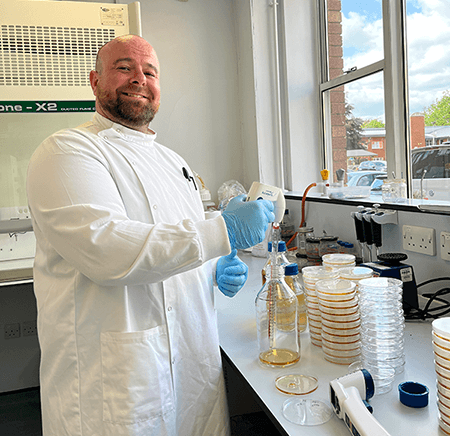ZERO2FIVE Food Industry Centre has successfully gained £3000 funding from Applied Microbiology International to support a summer studentship scholarship.
Mike Sullivan, an undergraduate Food Science and Technology student at Cardiff Metropolitan University, is the recipient of the scholarship and has joined ZERO2FIVE’s Ozone Research Group for 12 weeks over the summer.
An ex-forces veteran with a passion for cooking, Mike previously worked in the hospitality sector as a chef. It was his interest in the importance of food hygiene and preventing foodborne illness which led to him pursuing a Food Science and Technology degree.

Mike’s project, supervised by Dr Wenya Xue (ZERO2FIVE Postdoctoral Research Associate), will build on the research that Joshua Macleod (ZERO2FIVE PhD student) has been undertaking and will focus on clinical and environmental isolates of Listeria monocytogenes – the causative agent of listeriosis, and their potential to produce biofilms.
Biofilms are a matrix of bacteria and are traditionally very difficult to prevent and to remove; those caused by Listeria monocytogenes are especially worrying due to their persistence within food manufacturing environments and their potential to transfer genetic material related to biocide and drug resistance.
Mike said, “I am very happy to have this opportunity to undertake an Applied Microbiology International funded summer studentship here at Cardiff Metropolitan University’s ZERO2FIVE Food Industry Centre. I strongly believe the research we are undertaking will help develop new methods of food hygiene for years to come.”
Dr James Blaxland, Ozone Research Group lead at ZERO2FIVE said, “This project will be the first to use the recently upgraded ozone chamber and purpose-built aqueous ozone system at Cardiff Metropolitan University. We hope that Mike’s research will help to find solutions for Listeria monocytogenes removal in food manufacturing and clinical environments and will inform other research and industrial projects within the Group.”
